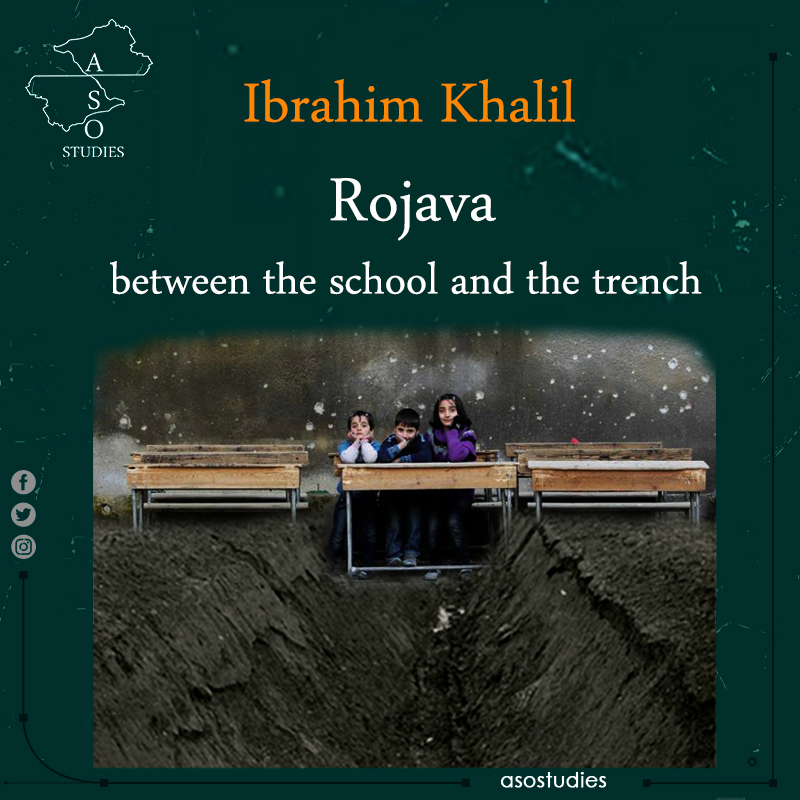Rojava between the school and the trench
Ibrahim Khalil
Perhaps the most wonderful story I have ever read in all that has been written about the "Japanese miracle" is the story of the young Japanese "Takeo Osahira" who was sent in 1860 as part of a scientific mission to the University of Hamburg in Germany to study a doctorate in mechanics and the manufacture of engines.
Young Takeo finished his university studies, which were mostly theoretical, without knowing the secrets of making an engine. But he did not give up on reaching his goal until the opportunity finally came to him when he attended an Italian industrial exhibition by chance and saw an engine that he liked and spent his entire salary on buying it. He took the engine to his room and began to disassemble it piece by piece, drawing a number for each piece he disassembled, trying to understand why it was placed in that place and no one else. Then he started working on assembling those parts again and installing the engine again. The operation took three days, during which he slept three hours a day and ate one meal. And he flew with joy when the engine finally started, but his teacher pointed to a broken engine and asked him to fix it, "This is the real test to prove your worth." Indeed, Takeo worked on it and discovered some damaged parts in it. After ten days of hard work, he was able to repair the damaged parts and start that engine, but then he realized an important fact, which is the importance of the small parts involved in the installation of engines. Takeo gave up his doctorate and worked as a simple laborer for nine years straight in the city's smelters.
When the Emperor learned of his story, he sent him 5,000 gold pounds as a reward, but Takeo spent it all on buying the equipment needed to make the engines and ship them to Nagasaki.
After his return to Japan, the Japanese Emperor asked to meet him, but he refused the invitation, saying, "I have not succeeded yet, sir, and I do not deserve the honor of meeting you." He continued his work for nine years in his country until he was finally able to manufacture the first ten fully Japanese-made engines, which he carried with him and headed to the Emperor's palace. And the first phrase said by the emperor while listening to the roar of the engines was, "This is the sweetest music I have ever heard."
Takeo's achievement at that point in his homeland's history gave rise to a great slogan: "If they work eight hours, I'll work nine, eight for myself and one for Japan."
A century after that story, Japan had been embroiled in World War II and emerged from it defeated and occupied with two atomic bombs and a destroyed infrastructure that lacked almost everything except morale and traditions of stubbornness, perseverance, and attention to the future instead of crying over the past.
Japan soon rose again and entered its second era of growth, starting in 1950, when the average annual income of the Japanese at that time was 1/14 of the average income of the American. A decade later, the proportion had fallen to 1/6. After another decade, in the year 1970, it became 1/2.5. And so on until the end of the second millennium, and today Japan has become the third economy in the world after the United States of America and China, with a national income of ($4.901 trillion), and the third in the world in the auto industry market. In the scientific field, Japan today spends more than $150 billion annually on scientific and technical research (ranked third after the United States and the European Union as a whole), and is the third best basic education system in the world with a point count of 99.9 points.
By projecting that great, successful and inspiring experience at the same time on a semi-autonomous region like "North and East Syria - Rojava", it did not emerge defeated from any major war, was not bombed by any atomic bombs, has an army that is well-numbered and armed, a relatively vast self-administered region, and a diverse population dominated by a segment of the population. Young people, an authoritarian and coherent ruling party, and a somewhat progressive theory, we might be able to come up with some fertile ideas.
The Autonomous Administration received the education file since 2014, that is, about eight years ago, with a semi-ready educational infrastructure that, despite its simplicity and modest capabilities, was a good base for launching a new revolutionary educational plan.
The new educational process was launched in a tense atmosphere internally and externally, and in the midst of administrative confusion, not only lacking experience but expelling expertise. The educational sector was dealt with as a complementary, dependent, and tributary part of the partisan political sector.
One of the results of that confusion and the domination of partisan ideology was that the educational level of students and students declined dramatically, until the ambition of everyone, students, their teachers and the administration itself, became to reach the level that the Syrian regime's schools and universities were originally backward.
On the other hand, the relationship with the United States was limited to the military side and within a glamorous formula for media consumption, "the coalition in the war against ISIS", but it was clear from the beginning that this "coalition" had only one mission and it would end with no political recognition, no diplomatic support, no foreign investment, no Help even in the most peaceful areas, which is the field of education. On the contrary, the Americans maintained their commitment to the security of Turkey, their partner in NATO, and on fine threads with the Damascus regime, and on high-level intelligence coordination with the Russian pole in the region.
I think the three lessons that the Rojava response did not draw from the Japanese miracle were:
The need to adhere to military neutrality (self-defense at worst)
The pursuit of knowledge (modernizing the education system and sending missions abroad)
Use that knowledge to establish a local industry.
But what happened was the opposite, and the Democratic Autonomous Administration was - despite its imported revolutionary theory - faithful to the traditions of the region in which it originated. Instead of sending his "Takeo Osahira" to the West to receive science and return with the engine, it got involved in the regional game as a small pawn between big players and in the internal game as a small dictatorship. She exhausted all her efforts and energies in petty partisan disputes to monopolize the rule of the region and exploit the energies of young people by distributing them to the army and employment sectors.

